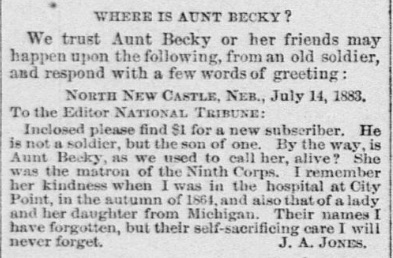Where is Aunt Becky?
As I was reading some old issues of the National Tribune the other day, I came across the following notice from the July 26, 1883. My mother’s name is Becky, so of course my cousins all call her “Aunt Becky,” so the headline jumped out at me:

I am always impressed by reminders of peoples’ kindness.
“Story of Aunt Becky’s Army Life”, by Sarah A. Palmer (1867). Much of the book is a narrative as told to my great grandmother, Sylvia Lawson Covey. It’s available in several formats, including Kindle. I have a copy of the first edition.
David, you made my day by completing the story. Thank you!
For folks who are interested, here’s an online edition of Sarah Palmer’s book:
https://archive.org/details/storyofauntbecky00palm
It looks like ECW readers found Aunt Becky! Huzzah!
And the “Story of Aunt Becky” is indicative of something larger: the reduction of historical narrative over time to only the quintessential elements. In the case of “the role of women during the Civil War” that narrative was condensed to “those who stayed behind at home,” and “those who followed General Hooker’s men.” Lost along the way was Mother Mary Bickerdyke (who made her first appearance on the field of Fort Donelson.) And the Vivandiere, in service on both sides. And the real role of Clara Barton in initiating “Lists of Missing Soldiers” and furthering the promotion of female war nurses. As well, more than a handful of wives followed their husbands — usually officers, but not always — from camp to camp. The most tragic tale is that of Ann Wallace, who arrived at Pittsburg Landing to “surprise her husband, William H. L. Wallace”… just as the Battle of Shiloh commenced. General Wallace was seriously wounded during the battle, following a stand of six hours at the Sunken Road, and the meeting between Ann and Will… (I will leave you to research that story, yourself.)
Thank you so much for your response to this post. I have been trying to explain this to folks for years. ECW has been very receptive to looking beyond the blue & red lines. “The reduction of the historical narrative over time,” is beautifully put. Again, thank you.
Tom Gaard’s write up of Aunt Becky’s burial site is on the Iowa Civil War Monuments site:
http://www.iowacivilwarmonuments.com/cgi-bin/gaarddetails.pl?1248728661~2